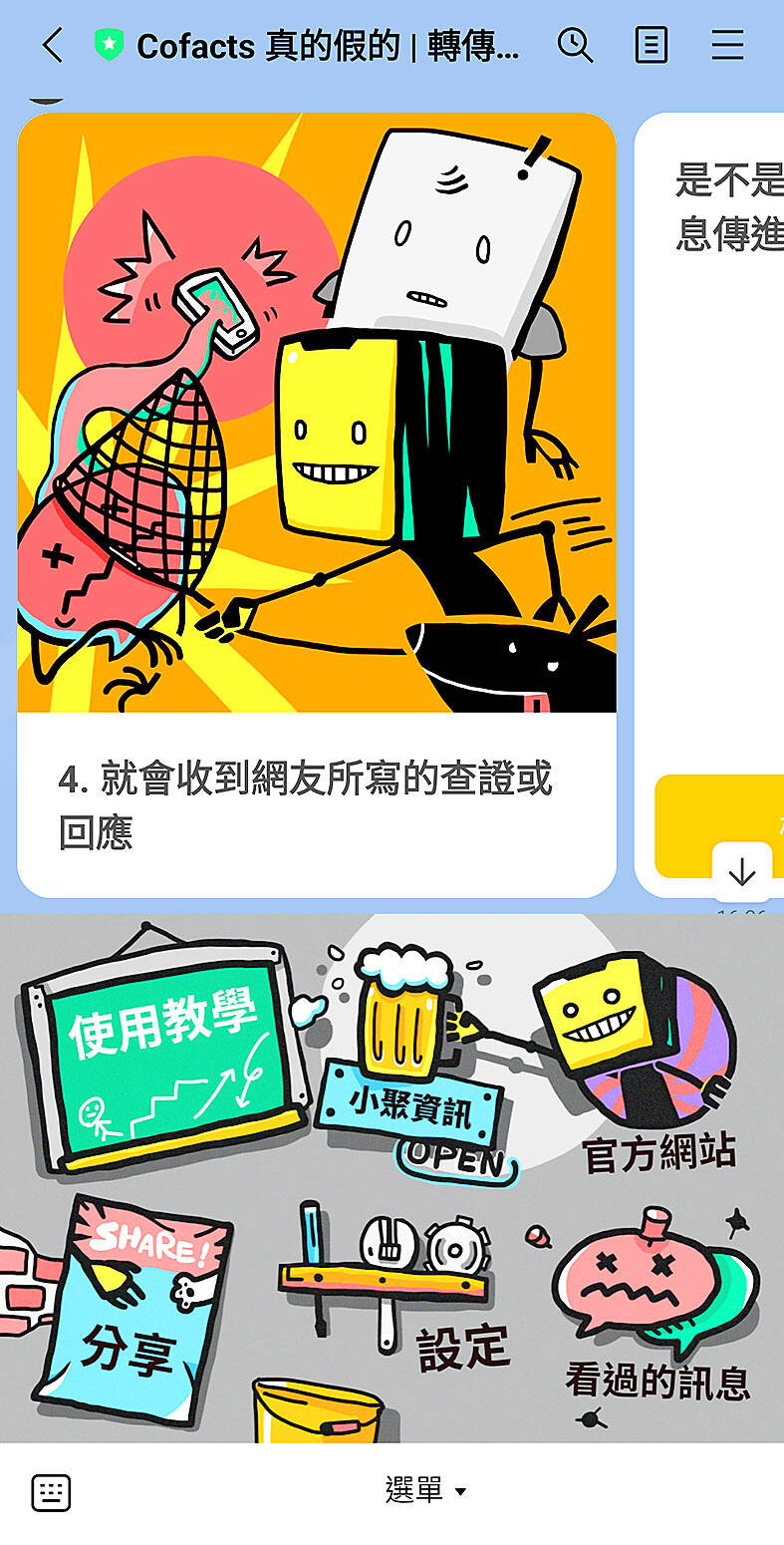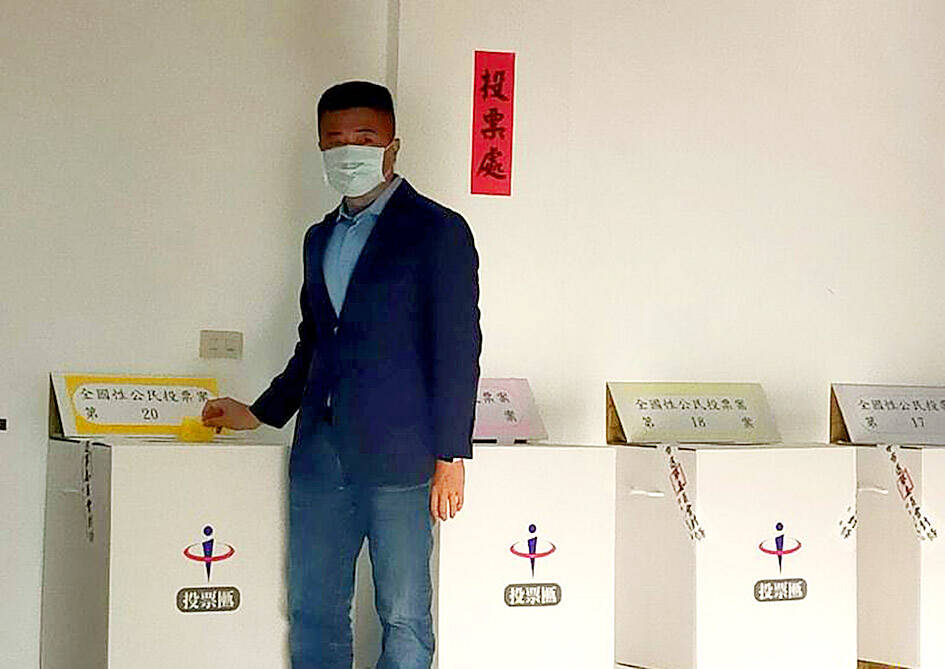Have you heard that voting in the morning increases the chances of your ballot being rigged? Or that there’s a concealed opening on the bottom of each booth so that election workers can remove votes for certain candidates? How about the notion that polling stations have hidden cameras that record the voters’ every movement?
None of those statements, which have been spreading on social media and messaging apps in the past few weeks, are true, according to disinformation debunkers Taiwan Fact Check Center (台灣事實查核中心, TFCC) and MyGoPen (麥擱騙). Both are non-governmental organizations certified by the US-based Poynter Institute for Media’s International Fact-Checking Network. Many of these items have been circulating for years now, and have already been debunked before — a quick fact check on one of the several LINE chatbots will reveal that.
However, a TFCC survey shows that nearly 60 percent of respondents have never used a fact checking service, despite 93 percent saying that fake news has a “serious” or “very serious” negative impact on society.

Screenshot: Taipei Times
TFCC deputy editor Claire Chen (陳偉婷) tells the Taipei Times that what’s challenging for fact checkers is that much election-driven disinformation is judgment based, such as a recent report slamming the current administration for steering society toward utter ruin due by supporting same-sex marriage.
Instead, they focus on the facts presented — the government, for example, allegedly spending NT$30 million to invite foreign groups to march in last month’s Pride Parade — and explain in detail why this is not true. In addition, they found that the same report has been in circulation since 2019, with just the dates, numbers and photos being updated.
“We only look at the facts that can be verified in the report,” Chen says. “We don’t look at personal opinion, such as ‘the government sucks.’ That’s subjective.”

Screenshot: Taipei Times
An alternative model is CoFacts, an initiative by government transparency community g0v, which encourages users to help verify, or mark as containing personal opinion, the submitted inquiries on an open-source, collaborative platform.
“We’re not saying what’s real or not,” cofounder Billion Lee (李比鄰) says. “We just provide a mechanism to invite different opinions and present them side by side.”
WHAT IS VERIFIABLE?

Photo: Chang Hsuan-che, Taipei Times
Disinformation pertaining to the nine-in-one election on Nov. 26 began appearing around June, Chen says. While the first ones were more indirect — bringing up divisive or controversial issues — the more recent ones lean toward spreading false information on election procedures and candidates.
CoFacts notes that site usage has increased by 23 percent since Nov. 1, although they cannot be sure if it is due to the election. Both groups rely on the public reporting suspected disinformation.
Lee tells the Taipei Times that in addition to political and election news, disinformation about the COVID-19 pandemic and vaccines have also increased in the past week. LGBTQ issues, such as gender equity education and the Pride Parade, have also seen a spike.
“The methods don’t differ so much from previous elections,” Lee says. “A lot of it is using negative statements to convince the reader that a certain candidate cannot be trusted.”
One of the most commonly searched items on CoFacts over the past month (more than 385 queries) is a “news story” dated Nov. 1 titled, “Democratic Progressive Party has passed a new drug act that allows students to possess more than five grams of narcotics before being charged with intention to sell!”
“In addition to homosexual island and HIV island, now Taiwan is going to become narcotics island!” the post alleges. But in fact, the act was passed in 2019, and on the contrary it tightened the limit for intent to sell for Class C and D drugs from 20g to 5g. The opposition vehemently protested the amendment, calling for zero tolerance instead.
People can still come to their own conclusions, Chen says, but they hope that the public gets into the habit of referencing multiple sources first.
“We want people to at least have the awareness to question the source material, and try to verify it before sending it to other people,” she says.
VOTE RIGGING?
TFCC last month provided a rundown of common election “rumor scripts” (謠言劇本) on its Web site, which include verified election procedural guidelines.
Pre-election stories usually involve vote-rigging. One circulated message, for example, warns people not to wear shirts emblazoned with the Republic of China (ROC) flag when voting, as they would be branded as Chinese Nationalist Party (KMT) supporters and their ballot would be automatically canceled.
There have also been calls to use transparent voting boxes, as some reports allege that the boxes are covered to hide the fact that they are rigged. The TFCC says that it’s done to protect voter privacy.
The TFCC also provides its verified reports to Facebook and other platforms, so they can use their information to flag certain posts that contain false information.
There are those who don’t agree with the TFCC’s findings, and ones who allege that the whole issue of fake news is fabricated by the authorities to root out voices critical of the administration. Facebook comments such as “But the elections really are rigged!” are seen under their posts.
“Many people don’t understand what we do,” Chen says. “We’re not trying to prove that your opinion is wrong. We just present the facts that we can verify.”
It’s also difficult for the TFCC to track down the originator of every piece of fake news, but they’re spread by both Chinese and local groups, Chen says. Another limitation is that so far, they can only verify news using public information.
One method of campaign disinformation is especially subjective — the use of political figure memes — and the TFCC urges people to find the source of the photo or video first before making judgment. Many are taken out of context.
For example, one can search for the entire clip of the meme showing Taipei mayoral candidate Chiang Wan-an (蔣萬安) with a foul expression at a temple banquet, and observe his behavior during the rest of the banquet before drawing conclusions, the TFCC report states.
With a recently expanded staff, TFCC is able to focus more on disinformation about politicians, but they still need to establish clear and transparent guidelines regarding which news items to investigate.
“This requires a lot of sensitivity,” Chen says. “We have to monitor whether we keep targeting the same people, the impact the information has on society, it’s reach … and how extensively the media has already covered it. Do we have anything to add to what’s already said?”

Growing up in a rural, religious community in western Canada, Kyle McCarthy loved hockey, but once he came out at 19, he quit, convinced being openly gay and an active player was untenable. So the 32-year-old says he is “very surprised” by the runaway success of Heated Rivalry, a Canadian-made series about the romance between two closeted gay players in a sport that has historically made gay men feel unwelcome. Ben Baby, the 43-year-old commissioner of the Toronto Gay Hockey Association (TGHA), calls the success of the show — which has catapulted its young lead actors to stardom -- “shocking,” and says

The 2018 nine-in-one local elections were a wild ride that no one saw coming. Entering that year, the Chinese Nationalist Party (KMT) was demoralized and in disarray — and fearing an existential crisis. By the end of the year, the party was riding high and swept most of the country in a landslide, including toppling the Democratic Progressive Party (DPP) in their Kaohsiung stronghold. Could something like that happen again on the DPP side in this year’s nine-in-one elections? The short answer is not exactly; the conditions were very specific. However, it does illustrate how swiftly every assumption early in an

Inside an ordinary-looking townhouse on a narrow road in central Kaohsiung, Tsai A-li (蔡阿李) raised her three children alone for 15 years. As far as the children knew, their father was away working in the US. They were kept in the dark for as long as possible by their mother, for the truth was perhaps too sad and unjust for their young minds to bear. The family home of White Terror victim Ko Chi-hua (柯旗化) is now open to the public. Admission is free and it is just a short walk from the Kaohsiung train station. Walk two blocks south along Jhongshan

Francis William White, an Englishman who late in the 1860s served as Commissioner of the Imperial Customs Service in Tainan, published the tale of a jaunt he took one winter in 1868: A visit to the interior of south Formosa (1870). White’s journey took him into the mountains, where he mused on the difficult terrain and the ease with which his little group could be ambushed in the crags and dense vegetation. At one point he stays at the house of a local near a stream on the border of indigenous territory: “Their matchlocks, which were kept in excellent order,